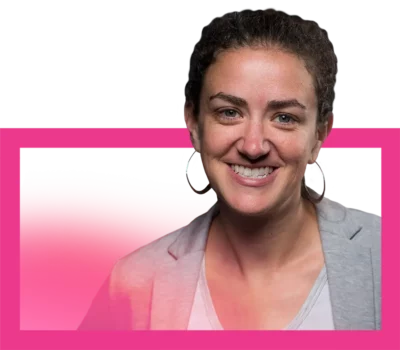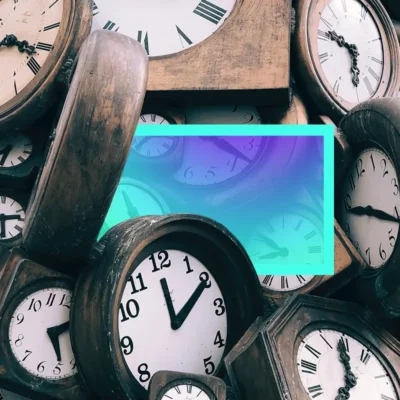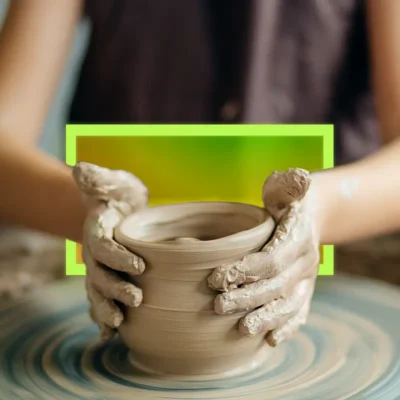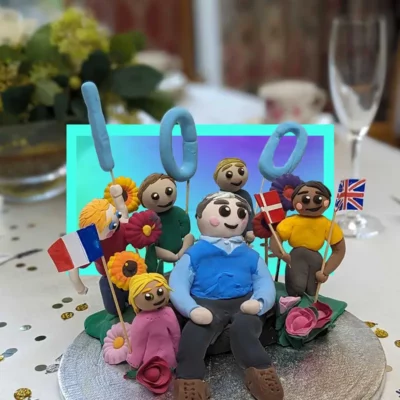Finding her to find me
The end of a troubled life ignites a search for answers – a truth long buried, and a truth not yet formed.
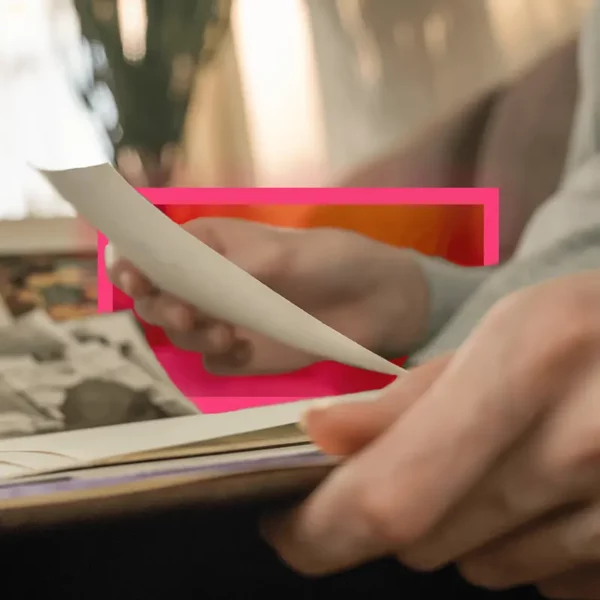
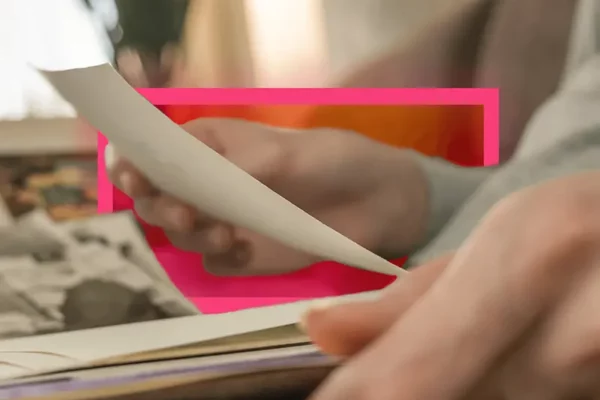
Table of Contents:
Transcript:
Finding her to find me
COURTNEY MARTIN: Now that I’m trying to understand my grandmother, I start to wonder: Might her unlived dreams have been the subconscious fuel that propelled me halfway across the country? And what do they mean for the life I’m about to lead?
ROHAN GUNATILLAKE: Sometimes it’s quite apparent where we come from – the apple doesn’t fall far from the tree. But when Courtney Martin loses her grandmother, a troubled woman with an obscured history, a different story begins to unfurl.
Before becoming the author of multiple books, including Learning in Public: Lessons for a Racially Divided America from my Daughter’s School, Courtney is trying to forge a bold intellectual life from the small, small world of her upbringing. As it happens, her grandmother’s story starts feeling like a key to that riddle.
In this series, we combine immersive first-person stories, breathtaking music, and mindfulness prompts so that we may see our lives reflected back to us in other people’s stories. And doing that can lead to improvements in our own inner lives.
From WaitWhat, this is Meditative Story. I’m Rohan, and I’ll be your guide.
The body relaxed. The body breathing. Your senses open. Your mind open. Meeting the world.
MARTIN: There are 11 of us here on this crisp February day in Colorado. We’re standing in a horseshoe shape. The grass crackling under our feet. My cousin’s young daughters, both blond, are wearing frilly dresses, and dancing around the stone we’re all gathered around: My grandmother’s grave.
It’s an unusually gray day, and the girls feel like the only colorful, carefree thing going. The rest of us are not sad, exactly. We’re more nervous because we’re trying to get it right.
My dad gives the first eulogy. He takes a deep breath beside me, smiles his genial smile, and says, “My mother was a brilliant person, a committed woman to her children. She loved us so much, did everything she could for us … but she had a hard life.”
I move closer to him. Even at 22 I know this kind of transparency doesn’t come easily to him. I sense him lovingly threading a delicate needle.
“She had so little peace during her life,” he goes on, “but now, she is finally at peace. She would have been so proud of all of you. And now she is at peace and can watch over you and be happy.”
Is that how this works? My grandmother is somewhere in the gray sky watching us attempt to put her to rest? I adore my dad. And at the same time, I have questions.
His younger sister is next, a petite woman with feathery diner waitress hair. She unfolds a piece of paper and begins reading. “Mom was very sensitive. She was incredibly political, loved to talk about current events with Ron,” she begins. My ears prick up. “She loved traveling, books, books, and more books. She loved art, especially Modigliani. She liked new ideas. She liked Harper’s Bazaar, Atlantic Monthly. She was an editor. She wanted to be a writer. She hated the color red.”
Suddenly I’m fully jolted. This eulogy about my grandmother could have been a description of me. Reading is my religion. I’m incredibly political. I love traveling, and I love Modigliani – those melancholic women, with their distinctive jutting chins. And what to make of our shared and bizarrely specific hatred of the color red? I recoil from red clothing, red furniture, always prefer not to be the red piece on any game board.
Suddenly, I don’t so much want to put my grandmother to rest as get to know her. Who was this woman whose blood – presumably not red – flows through my own veins?
Wondering about my grandmother, I suppose, is a way of wondering who I am. As I mark the end of her life, I’m beginning my own. In some ways, it’s not the life I was born for. Almost everyone I grow up with in Colorado Springs in the 1980s and ‘90s stays around after high school graduation, either going to colleges nearby or starting work right away. My imagination always feels a little too big for even my own britches.
Now that I’m trying to understand my grandmother, I start to wonder: Might her unlived dreams have been the subconscious fuel that propelled me halfway across the country? And what do they mean for the life I’m about to lead?
I start searching for her. I want to know who she really was, but I also, more than anything, want to find something that she had written. I have lost the chance to speak to her, but her own words feel like the next best thing.
First, I excavate my own memories. Which doesn’t take long, as there are only two. I’m 7 or 8 years old, and my grandparents come to visit. Near the end, as my grandparents are making their way towards the front door, my grandmother suddenly turns to me and calls me by someone else’s name: “Chrissy, go wash your hands!”
After shutting the door and taking a deep breath, my parents explain that Chrissy is my aunt, and that my grandmother has a “thinking problem.” I am scared, but also intrigued. I had no idea that could happen to a person’s brain.
My second memory is Halloween, probably just a few years later. This is my only recollection of being inside of my grandmother’s apartment despite the fact that she lives 10 minutes away. Instead of having a bowl full of candy for us to choose from, she hands both my brother and me a value pack of giant-sized candy bars. It is inappropriate, strangely unfestive, and so very exciting! Is this also because of her “thinking problem”? I wonder.
Now, starting out on my search, I discover that my grandmother has one living brother, Sonny, and that he lives in Denver with his wife, Hazel. I borrow my mom’s blue Honda over spring break and drive too fast up Interstate 25 to see them.
I’m so nervous to walk up the steps to their front porch to ring the doorbell on their squat, tan craftsman that I’m shaking. I’ve never met them, and now I’m just going to show up and ask a bunch of intrusive questions? I take a deep breath and will myself forward.
GUNATILLAKE: Let’s do the same, and let’s see if together we can express the qualities of relaxation and composure that Courtney so needs in this moment. Breathing in, the body filling with steadiness. Breathing out, the body letting go of tension. Breathing in, breathing out. In, out.
MARTIN: Hazel welcomes me in and points towards a weathered polyester blend couch that looks like it was very on trend in the early 70s.
Sonny sits in one arm chair, the bottom of his sky blue slacks barely gracing the top of his sweat socks, legally blind and smiling, and Hazel sits in the other, her hearing aid buzzing lightly. They’ve been married for 67 years. “Daddy, ‘member when Bookie was a little girl?” Hazel shouts at Sonny.
Bookie was my grandmother’s childhood nickname. “Of course I do,” Sonny says. He goes on to paint a picture of my grandmother. She was a reader and a big, ambitious thinker. As a girl, she longed to escape small town life.
Eventually she would make a different kind of escape. Near the end of high school, Bookie was sent back to Texas for a while – “oh, about nine months” – to live with her aunt. When she returned, she wasn’t the same girl.
I flash back to something my mom and dad told me often when I was young: that my grandmother was convinced my dad was going to be the president of the United States. Women of that generation, structurally prevented from living their own big dreams, often projected them on to their sons. She wasn’t so much delusional about what my dad was capable of as crystal clear of what she, herself, would never get to be.
Before I leave, Hazel hands me a plastic shopping bag filled with odds and ends that she’s found, related to my grandmother. “Thank you!” I shout in the vicinity of her hearing aid.
My search for my grandmother leads me to the many places where her “thinking problem” flared up: Mental institutions. I get a list from my parents, make phone call after phone call. Some no longer exist. Many destroy records after a decade.
Finally, I find just one in Pueblo that says they have a record on her and will send it to me.
It comes on a sunny Thursday to my apartment in Brooklyn. I hold the fat manila envelope to my chest, rush to my bedroom, and begin to open it before even taking my coat off. There are 17 sheets of paper inside. Half are typed, and half are written out by hand.
The file reads: “She came to a realization that she had accomplished her maternal obligations. She didn’t feel needed and began to experience depression.”
The report goes on: “The patient has a massive system of denial. She denies any dependency, depression, painful, or unpleasant aspect of her life.”
The report also notes the role of my grandfather, and how he sabotaged her from getting well. I know from my dad that his father was a truly difficult person. He didn’t help his wife recover; if anything, he was part of the problem.
It’s so profoundly sad to me. She was discharged on 12-31-82. My second birthday. While I was just discovering language, she was being locked inside of her own fractured reality.
Outside Sonny and Hazel’s, I sit in the driver’s seat and look through the contents of that shopping bag. There are photographs of my grandmother as a smiling kid in her folk dancing uniform, her leg poised to trot off to a beat, and some more formal portraits. Her chin juts out, just like my dad’s, just like Modigliani’s lonely women. There are letters on General Foods Sales Company stationary from my great grandfather. And there are even Western Union Telegrams on flimsy yellowed paper from 1939. Apparently my grandmother got to travel to the World’s Fair in Queens, New York with her folk dancing troupe, but took ill so she landed in St. Luke’s Hospital. When her case was no longer acute, she was moved to the Barnard College dorms to convalesce.
The same dorms that I spend four years in, thinking I was the first person in my family to ever stay in New York City, much less sleep in those little wooden beds. As a girl, my world had always emphatically been in Colorado. Everyone I knew lived there, contentedly so. My parents met in 6th grade, married at 19 years old. No one I knew wrote or gallivanted around New York. It seemed very big and very romantic; I was small and pragmatic.
Meanwhile, all this correspondence from the past. A few revelations. Many words to my grandmother, and about her. But no words from her.
Not a single word from the woman who wanted to be a writer – to reach beyond the narrow world that she was born into.
GUNATILLAKE: There were so many difficult conditions in Courtney’s grandmother’s life. So many closed off doors, in her outer and inner worlds. So much silence. Recognising that, when you next have the opportunity to give someone a voice, why not do so. Consider this for a few moments.
MARTIN: The year I spend searching for my grandmother, it changes me. I start covertly slipping my mom’s feminist books off the shelf, devouring Sylvia Plath’s Bell Jar and the like. I know that women in generations past rarely got to live their creative dreams. But intellectually understanding that is one thing; being confronted with the way in which sexism, mental illness, and tragedy commingle in your own bloodline, is another. You carry it with you – both, gift and burden.
My grandmother’s death wakes me up to how lucky I am to be born when I was, but it also reminds me that there is nothing foretold about achieving your creative dreams. Mental illness undeniably runs deep in my family, this is not in my control. But each generation has the honor and obligation to live more liberated than the last, so I will do all I can.
As I speak these words, I’m 41 years-old. I’m a mother of two little girls. I’m a writer. I’ve written four books and, for better and probably sometimes for worse, I take up a kind of intellectual space in the world that I never saw anyone take up back in Colorado Springs.
I put my words on paper because, well, because I want to. I want to be part of that bigger world I always sensed was just over the hedges. But I also write because my grandmother never got to.
I write for her. And I write for me. And I write for my daughters. I want them to always be able to find my words, to know who I am, flaws and all.
We are all, every single one of us, made up of other people. I have 189 DNA fragments from my paternal grandparents. I also inherit, as do so many of us, an unlived life or two. I’m trying to live the shit out of mine – protecting my dreams, making space for my ideas, not letting the caregiving life obliterate the creative one. And I’m writing it down all the while.
I never find my grandmother’s own words, but my dad does give me a little sheet of paper he finds among her things. It is a quotation from journalist Leo Rosten:
“Happiness,” it reads, “comes only when we push our brains and hearts to the farthest reaches of which we are capable … the purpose of life is to matter – to count, to stand for something, to have it make some difference that we lived at all.”
Rohan’s closing meditation
GUNATILLAKE: Thank you Courtney, what a rich story.
There is so much in it, and some challenging themes, so do please take care of yourself if it has brought anything up for you.
And as you’ll know by now, we close each episode with a meditation based on the story we’ve just heard. While there was so much to choose from, the line I want us to jump off from is when Courtney talks about how while some of the constraints of our lives are not in our control, many of them are, and in her words, “every generation has the honor and obligation to live more liberated than the last.”
Liberation is an important word in mindfulness. I remember one of my main teachers telling me that it’s how I should measure progress. “If what you do leads to you feeling more free, then you’re on the right track.”
So inspired by that, and by the story of Courtney and her grandmother, let’s reflect on liberation and lineage.
To begin: How are we liberated now?
It can be so easy for the mind to focus on what constrains us, but let’s put that to one side for the moment. And take a minute or so to reflect on the things that you are free to do now that your grandparents were never able to.
Whatever comes to mind. For me it’s something about being able to live in a place where I meet people of all kinds of backgrounds. And something about being able to marry and start a family outside of my ethnic group. Something entirely unheard of in my grandmothers’ time.
What is it for you? And, is there appreciation? Let there be appreciation.
I’ve been thinking a lot about legacy recently. COP26, the massive climate change conference (you might have heard about it), recently took place literally down the road from me. It was about a lot of issues, but the thing I kept coming back to was how to make decisions today that allowed those after us to be in a better place. Results that we ourselves may never see.
So bring to mind something that constrains you today. And explore what you might do to help those who come after you be free of it.
What can we do to give the next generations a more liberated life than ours?
Let’s finish with a reflection on what liberation means moment by moment. When we wake up tomorrow, we are the same person but also a new one. So with eyes closed, join me in tuning into where there is that which is not liberated. And how might we relax, open, allow so that liberation can happen.
Body. Mind.
When my teacher was pointing me to freedom and liberation as an indicator of progress, they were referencing an older quote: Just as the ocean has just one taste, the taste of salt, this teaching and training has one taste: the taste of liberation.
I love that.
So let’s always keep that in play as a possibility as we explore mindfulness and meditation in whatever way we do. Yes there’s calm and yes there’s relaxation. But there is also the prize of freedom from that which constrains us.
Thank you Courtney, for your energy to go beyond.
Thank you Maryanne. I recognize you in my own family.
And thank you.
Go well.

